
| Themes |
| Programme |
| - 22 Jan. 2007 |
| - 23 Jan. 2007 |
| - 24 Jan. 2007 |
| Special Events |
| 23 January 2007 (Tuesday) |
|
Technology Scenarios for a Sustainable Future
Day 2 of DSDS 2007 began with a keynote address by Mr Claude Mandil, Executive Director, IEA (International Energy Agency), France. Titled The Global Energy Challenge: technology scenarios for a sustainable future, his speech began with the persuasive contention that the three Es (energy security, environment protection, and economic growth) are inviolable pillars of sustainability. The growth pattern, however, would lead to significant increase in emissions and result in high import dependencies for all major consumers. These two factors, coupled with the ever-growing threat of climate change, would hurt long-term economic growth.
The IEA reference scenarios highlight the fact that the world is on a completely unsustainable path—with a projected 85% of energy coming from fossil fuels in 2050. This would mean a steep increase in global emissions. But, if the world dedicates more resources, research, and commitment to new technologies to increase energy efficiency; introduces cost-effective renewables; and applies carbon capture and sequestration technology, emission levels in 2050 would be the same as they were in 2003. The choice before the world could not have been clearer—switch to newer, cleaner technologies now to ease the pressure on the planet’s climate, or continue with a business-as-usual mindset and be prepared for runaway global warming in less than 50 years. |
| Session Panelists |
Chair Speaker |
| Top |
| Keynote Address: Perspectives on climate change |
Policy formulation with regard to climate change must follow
the principles of equity and sustainable development, said Dr R
K Pachauri, Director-General, TERI. Efforts should be directed towards
enhancing social and natural capital. In addition, there is a need
to manage natural resources carefully. For instance, in the case
of climate change, the atmosphere is to be managed efficiently.
The impacts of global warming will be felt most by the developing
countries. Therefore, there is a need to cope with the situation
using traditional and modern knowledge. On the issue of technology
transfer, UNFCCC clearly specifies that the incremental cost will
be supplied by developing countries. While covering of incremental
cost is essential, the overall life cycle cost should also be looked
at. |
| Session Panelists |
| Chair Speaker |
| Top |
| Energy for Sustainable Development | |
It is now beyond doubt that the energy choices we make have a direct bearing on our efforts to attain sustainable development. Session 3 of DSDS 2007 saw focused discussions around making the right energy choices, and in a manner that leads to a decisive shift of development paradigms towards just and sustainable models. Speakers in the session agreed that the year 2006 has been a minor watershed in the context of energy use, with governments, business, scientists, and society making measurable efforts to reduce the use of fossil fuels, increase awareness of the environmental complications arising from fossil fuel emissions, and promote new and renewable energy systems. However, the magnitude of the challenge facing the sustainable development movement can be gauged by the fact that such initiatives have barely scratched the surface of the problem. The fact remains that global energy demand is going to continue to increase, and fossil fuels will be the only widely available option to meet the increased demand. The challenge before the world community is to increase the basket of options available to a world hungry for more energy, and fill that basket with clean technologies and renewable sources of energy.
To achieve this, speakers suggested several strategies, central to which was the need to foster greater cohesion and collaboration between stakeholders. PPPs (public–private partnerships) have a key role to play in this context. The traditional template for PPP – an institutional arrangement between the private sector and governments – needs to be redefined and expanded to include civil society and local bodies. Governments, it was suggested, should make more concerted efforts to create an enabling environment for the blossoming of PPPs and the integration of energy, environment, and society. A clear regulatory framework, an incentive regime, and policy support were some of the mechanisms governments could consider. Speakers also spoke about the need for greater international consensus on energy issues, especially the urgent issue of reducing the environmental impacts of fossil fuel consumption. They noted that while developing nations must approach the energy–environment question within their broader development goals, it is important for developed countries to take a lead in this regard. |
|
| Session Panelists | |
| Chair Former Acting Secretary General and Director of Research at OPEC as well as Advisor to Kuwait Petroleum Corporation, Austria Speakers |
Speakers |
| Top | |
| Keynote addresses |
Atmospheric chemistry for climate in the Anthropocene
There is an urgent need to stabilize the carbon dioxide in the
atmosphere by reducing emissions by 60%. Although methane emissions
have stabilized in the past five years, nitrous oxide emission is
still a matter of concern. Chlorofluorocarbon reduction has been
achieved, but due to its long lifetime, it will continue to linger
in the atmosphere for at least 70 years. Solutions are available
in the form of striving for energy efficiency; carbon capture and
storage; using nuclear power and renewable energy; and so on. One
option on offer is an experiment that involves releasing sulphur
into the stratosphere (as in volcanic eruptions). Advanced models
that enabled the creation of the exact atmospheric environment under
controlled conditions were established. Thereafter, the model was
used to investigate the effects under three different scenarios.
In the first scenario, carbon dioxide concentration is doubled;
in the second, sulphur is ejected; and in the third, both these
situations occur simultaneously. The outcome showed that when both
situations occurred, the climate nearly imitates actual conditions.
Prof. Crutzen emphasized its importance in the present day. |
| Environmental threats and international
governance on environmental matters
The planet warming to an average of 2 °C is not alarming. However, this minimum threshold demands a reduction in GHGs (greenhouse gases). France is aware of this, and hence, the French energy policy has set a target of reducing emissions by 75% by 2050. Alan Juppe wished that this target would become common for all industrialized counties including the US. Juppe also called for better integration of policies in the poorer countries based on radical, rapid, and effective action to curb GHGs. He emphasized on the mainstreaming of environmental concerns and the insufficient support to developing countries. Juppe concluded by saying that it was time to face responsibility
and give the UN tools, means, and authority it needs by upgrading
UNEP into a special agency for environment. He proposed setting
up of UNEO (United Nations Environment Organization) with a strong
coordination mandate. An umbrella organization, the UNEO would ensure
policy and decision-making based on sound and reliable knowledge,
headed by an executive director who would be the global face and
voice of the environment. |
| Session Panelists |
Chair Speakers Environmental Threats and International Governance on Environmental
Matters |
| Top |
| Sustainable use of natural resources | |
| Discussion in the session focused on various aspects
of sustainability as they relate to natural resources—from academic,
policy, donor, and industry viewpoints. Defining the 21st century
as an era of ‘knowledge expansion’, the discussions emphasized
the need to use the tools of science to build an issue-based approach
to sustainability—one that can reliably predict the future and
create a network of data and knowledge.
Multi-lateral perspectives on natural resources were also put forward in the session. These include valuation of ecosystem services, and development of mechanisms for payments for ecosystem services. The point was made that households who live near natural resources tend to better manage them, and meeting short-term needs of communities who depend on natural resources are thus as important as long-term sustainability goals.
Private sector initiatives to supply water, waste, and energy management services were stressed by speakers. Sustainable development, it was stated, can and should become an integral part of business functioning. In the same vein, the critical role of biotechnology was discussed, and its potential to make enormous contributions in meeting food, energy, and clean water needs was noted. Biotechnology can also help poor nations that cannot normally access expensive technology through agricultural innovations to satisfy their basic food and nutrition needs. Panellists then commented on the relatively less discussed issue of governance. Government need to create more choices so that better decisions can be taken at the individual level. Speakers also made the key point that local governance institutions are normally more willing to pay for local development than national institutions, and the former could also act as engines of local innovation to resolve conflicts between local-level livelihood needs and countervailing macro-forces. |
|
| Session Panelists | |
| Chair Speakers
|
Speakers |
| Top | |
| Sustainable Development Technologies for the poor | |
Environment and poverty were traditionally treated as two disconnected issues having few overlaps within the development paradigm. But increasingly, through focused developmental initiatives in the recent past, the gap between the two issues has reduced. In this session, the discussion shifted towards one of the key outcomes of the reducing disconnect between the environment and the poverty conundrums. This is the search for technologies for the poor that are not only affordable but also sustainable. It was stated that such technology should essentially fulfill 3 As: Affordability, Accessibility, and Appropriateness. In this context, speakers recommended framing technology-specific developmental programmes focusing on the vulnerability of the poor, and which draw upon traditional, indigenous knowledge for inspiration.
To address the affordability aspect of sustainable technologies, panelists suggested the creation of markets that involve the poor as actors or producers in the value chain. Speakers also called on governments to address the issue of absence of micro-enterprises for economic development for the poor in developing countries. Other subjects that were discussed in the session included international funding for research and development in global public goods, collaborative North–South research and South–South cooperation, and the need for stakeholders to work towards bringing about a change in mindsets. |
|
| Session Panelists | |
| Chair Setting the theme Speakers
|
Speakers
|
| Top | |
| Keynote Address: Evolution of Environmental Markets: A Practitioner's View of the Past, Present and Path Forward |
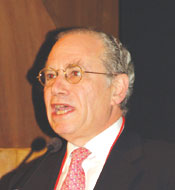 Mr
Richard Sandor’s address focused on devising market-based solutions
to environmental problems such as rising GHG (greenhouse gas) emissions.
Giving the example of the Chicago Climate Exchange – a voluntary
emissions management and trading system – Mr Sandor explained
how environment markets can be a force-multiplier in the fight to
reduce GHG. The Chicago Climate Exchange market architecture aims
to cut emissions by 6% from the baseline levels by 2010. The price
discovery mechanism is driven by seasonality, temperature, commercial
and industrial growth, and GDP growth, and is sensitive to political
impacts. Mr
Richard Sandor’s address focused on devising market-based solutions
to environmental problems such as rising GHG (greenhouse gas) emissions.
Giving the example of the Chicago Climate Exchange – a voluntary
emissions management and trading system – Mr Sandor explained
how environment markets can be a force-multiplier in the fight to
reduce GHG. The Chicago Climate Exchange market architecture aims
to cut emissions by 6% from the baseline levels by 2010. The price
discovery mechanism is driven by seasonality, temperature, commercial
and industrial growth, and GDP growth, and is sensitive to political
impacts.
Mr Sandor went on to suggest that India could now replicate the same process followed by the Chicago Climate Exchange, considering that the country’s 9% GDP growth is generating a lot of wealth. Some initiatives that need to be looked at to build an environmental market highlighted by Mr Sandor include regulation or private sector laws that create the enforcement of property rights, building underlying institutions to perform functions ranging from clearance, tax allowances, knowledge acquisition, and monitoring and verification. |
| Session Panelists |
| Chair Speaker |
| Top |
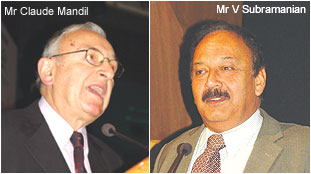 Mr
Mandil’s speech then focused on comparing and contrasting
future emission scenarios. To understand the potential emission
reductions new technology options can help achieve, the IEA has
created scenarios till 2050, which is the realistic point at which
newer technologies can make a significant difference to emission
trends. Mr Mandil shared these scenarios and pointed out that optimal
deployment of clean technologies already available would help reverse
global emission trends by 2050, but persisting with conventional
technologies would exacerbate emissions to unmanageable levels.
Mr
Mandil’s speech then focused on comparing and contrasting
future emission scenarios. To understand the potential emission
reductions new technology options can help achieve, the IEA has
created scenarios till 2050, which is the realistic point at which
newer technologies can make a significant difference to emission
trends. Mr Mandil shared these scenarios and pointed out that optimal
deployment of clean technologies already available would help reverse
global emission trends by 2050, but persisting with conventional
technologies would exacerbate emissions to unmanageable levels.
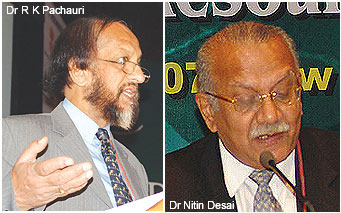

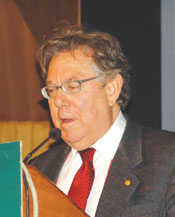 The
focus of the address by Prof. Paul Crutzen, Director Emeritus, Max
Planck Institute for Chemistry, Germany, was on the scientific aspects
of climate change and its history, the challenges we face today,
and the possible solutions. The issue of climate change needs to
be broadened from the main theme of carbon dioxide emissions, to
consider other ozone-depleting gases such as methane, water vapour,
and nitrous oxides. Heightened human activity has changed atmospheric
chemistry and, as a result, global temperature is rising. We need
to ask ourselves the question: ‘what can we do?’
The
focus of the address by Prof. Paul Crutzen, Director Emeritus, Max
Planck Institute for Chemistry, Germany, was on the scientific aspects
of climate change and its history, the challenges we face today,
and the possible solutions. The issue of climate change needs to
be broadened from the main theme of carbon dioxide emissions, to
consider other ozone-depleting gases such as methane, water vapour,
and nitrous oxides. Heightened human activity has changed atmospheric
chemistry and, as a result, global temperature is rising. We need
to ask ourselves the question: ‘what can we do?’ 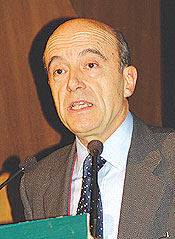 Alan
Juppe, former Prime Minister of France and Mayor of Bordeaux, reiterated
that the existing international framework is inadequate to meet
the challenges of global environment. He emphasized that climate
change was undermining development. It is likely to cause massive
migration of populations termed as ‘climate change refugees’.
An increasing number of extreme meteorological phenomena would also
need attention. Food and water crises must be considered as security
problems. The cost of inaction would be huge, and thus, collective
and immediate action is necessary.
Alan
Juppe, former Prime Minister of France and Mayor of Bordeaux, reiterated
that the existing international framework is inadequate to meet
the challenges of global environment. He emphasized that climate
change was undermining development. It is likely to cause massive
migration of populations termed as ‘climate change refugees’.
An increasing number of extreme meteorological phenomena would also
need attention. Food and water crises must be considered as security
problems. The cost of inaction would be huge, and thus, collective
and immediate action is necessary. 
